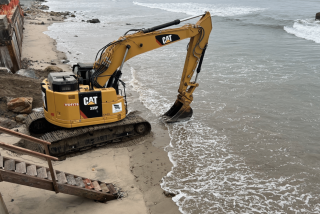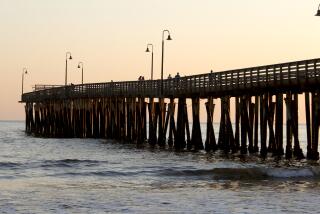Life hasn’t been a beach
George and Sharlee McNamee never realized how complicated a barbecue could be.
The retired couple’s bluff-top home overlooks a stunning stretch of Corona del Mar State Beach, studded with the jagged rocks of nearby Inspiration Point. It’s been their slice of paradise, and they looked forward to whiling away their golden years.
Instead, the McNamees have filled the better part of a decade battling the state Coastal Commission over their backyard. According to state officials, the couple’s oasis -- two picnic tables, thatched palapa, storage cabinets, shower, bathroom and barbecue -- on the beach portion of the McNamees’ property is illegal development that must go.
The McNamees disagree. And it’s not just about the grill; in their view, liberty itself is at stake: “George and I are the old school,” Sharlee McNamee, 73, said. “We think you should be able to dispose of your property as you see fit, as long as you’re not harming anyone else.”
It doesn’t matter that the improvements are on the McNamees’ property. Under the 1976 Coastal Act, private and public shorefront property are subject to state regulation to protect the environment and ensure public beach access.
In the McNamees’ case, the state says their recreational amenities involved unpermitted grading and damage to the fragile bluff, and gives the perception of a private beach -- which intimidates beachgoers into avoiding the public sand nearby.
After a tangle of lawsuits, commission hearings and environmental studies, the McNamees are pretty much back where they began: in apparent violation of the Coastal Act. Now newly represented by property rights group the Pacific Legal Foundation, they’re crossing their fingers for their current appeal.
The Coastal Commission has several issues with what’s on the sand. For instance, attached to the beige shed at the foot of the McNamees’ bluff is a small white sign that reads “George’s Beach.”
“It looks very much like a private beach,” said Lisa Haage, the commission’s chief of enforcement.
“This is not about a picnic table and not entirely about the McNamees,” said Mark Massara, director of the Sierra Club’s coastal programs. “This is about unpermitted cabinets, stoves, water lines and gas lines running up the hillside, and showers -- pervasive, unpermitted development that creates an atmosphere of a private beach on the sand.”
The McNamees dispute that their small “George’s Beach” sign shoos the public away, even from their privately owned stretch of sand. They say people are constantly using their tables, rinsing off under their shower, snapping photos of their garden, nursing stingray bites at their outdoor sink, stashing chairs behind their lockers, convening Scout meetings -- even getting married.
That doesn’t change the fact that the McNamees are violating the law, the Coastal Commission says.
“If someone really likes something -- even if it’s illegal -- that doesn’t make it legal,” Haage said.
Another problem? The thatched canopy and grill, officials say, detract from the ocean view.
The couple’s argument that they’re generous with strangers in allowing them use of their yard has “never been anything other than a throwaway PR line,” Massara said. “The Coastal Commission has been nothing but accommodating to these people, allowing them to maintain this illegal development for years and years and years while the McNamees sue the Coastal Commission.”
He said several properties nearby have similar violations and the commission has pursued actions against some of those homeowners.
George McNamee, 76, a retired insurance executive, and his wife have owned their home since 1978. They say many of the items in contention were on the beach when they moved in.
Presiding Judge James J. Di Cesare of the Orange County Superior Court ruled last summer that the commission showed, using aerial photographs that the couple disputes, that the original amenities were replaced by new and improved versions. And commission staff found that the McNamees’ 1981 permit to remodel their house prohibited beachfront modifications.
After years of administrative back-and-forth, the state issued a cease-and-desist order in 2004. The McNamees then applied for an after-the-fact permit from the commission and were denied. They face a possible fine of $6,000 a day if they fail to clear their beachfront; their attorney has requested a stay of the order until the appeal is decided.
Having nearly exhausted their options, the retirees are contemplating the end of George’s Beach because they say they’d find it difficult to use even their private stretch without the amenities. George, who has a heart condition, said he can’t easily climb the 80 steps to the house to retrieve items or use the bathroom. And the shade canopy was a measure to protect him from another bout of melanoma.
Beyond the hundreds of thousands of dollars they’ve sunk into fighting an order they consider wrong, George would have to rip out his beloved rosebushes and flower garden, which he sometimes plants to bloom in the image of an American flag. The McNamees would then have to pay to replace their plants with erosion controls such as sandbags and native vegetation.
“They don’t pollute, they don’t cause any injury to the public -- this is just a totally innocuous situation,” said their attorney, Paul Beard, a principal attorney with the Pacific Legal Foundation and head of the group’s Coastal Land Rights project.
“It’s the principle of, do you own your property or don’t you?” Sharlee McNamee said. According to the couple, the commission is overreaching, “a small tyranny that has destroyed the concept of private property in California.”
“What the Coastal Commission is doing,” she said, “is depriving us of a portion of our lives.”
--
susannah.rosenblatt @latimes.com
More to Read
Sign up for The Wild
We’ll help you find the best places to hike, bike and run, as well as the perfect silent spots for meditation and yoga.
You may occasionally receive promotional content from the Los Angeles Times.






